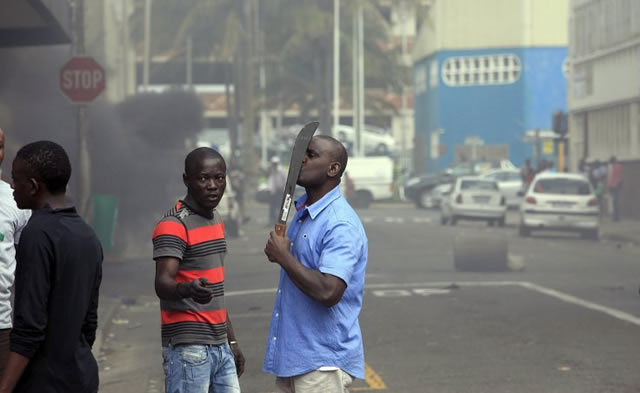Editorial Comment – Xenophobia: Stitch in time saves nine

 ON April 6, the people of Rwanda commemorated 21 years since the 1994 genocide, which left close to a million people dead.
ON April 6, the people of Rwanda commemorated 21 years since the 1994 genocide, which left close to a million people dead.
On April 27, South Africans will celebrate Freedom Day, 21 years since apartheid ended when the first non-racial democratic elections of 1994 were held and the late president Nelson Mandela became the first black South African president.
The apartheid system and the Rwanda genocide are some of the evils that scarred the continent in the 20th Century. But Mandela rightly reminded his South African counterparts about the attainment of democracy: “There is no easy walk to freedom anywhere and many of us will have to pass through the valley of the shadow of death again and again before we reach the mountaintop of our desires.”
As South Africans passed through those valleys of the shadow of death, their brethren on the continent were happy to be their brothers’ keepers, unlike the biblical Cain.
Although it was Utopian, everyone thought post-apartheid South Africa would learn from the mistakes made by its brethren to create a truly Rainbow Nation. Although it was a rainbow without a black colour, we accommodated that believing that South Africa had infused all thought ideas and races within that rainbow.
But the past few years have seen that rainbow slowly fading, and there is grave danger that it will disappear into oblivion.
The ongoing barbaric attacks on foreigners in Durban are a scar that a democratic South Africa cannot wish away, especially as they celebrate 21 years of democracy next week.
They might be pulling down and/or defacing statues — vestiges of colonialism and the evil apartheid system — but black South Africans have also displayed extreme hate towards their brothers and sisters from different parts of the continent.
The milieu over competition for jobs and business opportunities has created a South Africa that forgets where it came from while, at the same time protecting white capital. In the past few months, many lives have been lost, hundreds of people displaced and their goods looted. Millions of foreigners are living in extreme fear.
The attacks on foreign nationals from other parts of Africa especially Zimbabwe, Mozambique, Malawi, Burundi, Somalia and DR Congo have reached fever pitch, forcing the South African government to try and engage its citizens and the envoys of the affected nationals.
So precarious is the situation that some African governments are now in the process of carrying out voluntary repatriation of their citizens. The
Malawi government is a case in point where government spokesperson, Kondani Nankhukwa was reported as having said they were repatriating 400 nationals.
Although the matrix of these xenophobic attacks has been analysed from various viewpoints, with the hope of arriving at a workable solution for all parties, it was the view expressed by Malawi law lecturer Sunduzwayo Madise that raises alarm bells. Madise is demanding “emergency” Sadc and African Union meetings.
Like most people, Madise is breathing fire and brimstone at South Africa as he wrote on his Facebook page: “If the South Africans don’t want other Africans in their country, let’s tear up the Sadc Treaty for a start; and sanction their goods, services and businesses. Let us see if an implosion will not result as the fever catches the global market.”
We hope that the Zulu King Goodwill Zwelithini and Edward Zuma (President Jacob Zuma’s eldest son) are reading the fine print in Madise’s call, since the two made their calls on the basis of their social and political standing.
It is untenable that people in positions of authority, whose responsibility is to censure errant behaviour and ensure peace and order should be in the forefront calling for violence against foreigners.
And, Edward Zuma cannot also hide behind empty words like: “The South African Human Rights Commission can arrest me for my comments, it’s fine. I am not the citizen of President Jacob Zuma. I am a citizen of South Africa. My thinking is independent to that of the president.”
He knows full well that he is putting President Zuma in a corner. At the same time, he should be answerable for instigating hate and violence. Both the king and the president’s son are enemies toward achieving Agenda 2063, and they should also be held responsible for thwarting Africa’s growth opportunities.
Meanwhile, it’s time that regional and continental bodies took drastic steps to address this urgent matter. Africa cannot afford another conflict.









Comments